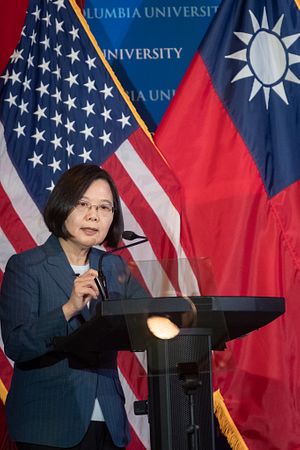Beijing established relations with the Solomon Islands and Kiribati last week, leaving Taipei with just 15 formal diplomatic allies. While the moves by China aimed to limit Taiwan’s international space and weaken the administration of President Tsai Ing-wen, their immediate aftermath calls into question whether they had the desired effect.
The two Pacific Island nations were the sixth and seventh diplomatic allies to defect from Taipei to Beijing during Tsai’s first term as president. But Tsai, who hopes to win reelection in January 2020, has emphasized her administration’s unofficial yet robust ties with the United States, which last week threatened to cut aid to the Solomon Islands after it decided to recognize Beijing.
The Solomon Islands had long been speculated to be on the brink of switching ties to Beijing, rendering last week’s announcement anticlimactic in Taiwan. Kiribati’s decision, which Taipei said was spurred by Beijing’s offer of airplanes and ferries, was far more sudden; rumors of the switch did not pulsate through Taiwanese media until the day before its announcement.
Reports have suggested that Haiti and Tuvalu could be on the brink of switching their own diplomatic recognition, although Tuvalu’s new prime minister reaffirmed his country’s commitment to Taiwan last week.
Taiwan’s diplomatic allies largely consist of small countries heavily reliant on foreign aid. Taipei and Beijing have long competed for the recognition of these countries, most of which are Pacific Islands, Caribbean or Central American nations.
Beijing began to escalate its strategy to poach Taipei’s allies after the election of Tsai, who refuses to recognize the “1992 consensus” – a supposed agreement between Chinese Communist Party and Kuomintang officials that both sides agree there can only be “one China,” but agree to disagree on what “one China” entails. Beijing has never publicly recognized the latter part of the consensus.
But Tsai’s refusal to recognize the consensus retains broad support within Taiwan, where voters across the political spectrum support Taiwan’s democracy and oppose unification with China. Tsai and her Democratic Progressive Party, which supports eventual Taiwan independence, have gained momentum since Tsai delivered a well-received response in January to a speech on Taiwan by Chinese leader Xi Jinping in which he refused to rule out the use of force to unify Taiwan and China.
Tsai has faced criticism for losing allies to Beijing in the past, but the defections of the Solomon Islands and Kiribati have allowed her to emphasize her efforts to strengthen unofficial ties with the United States and European Union nations.
Last week, Reuters reported that U.S. Vice President Mike Pence canceled plans to meet the newly elected leader of the Solomon Islands after its decision to break its ties with Taipei. The United States also said it would reassess aid to the Solomon Islands in response to the diplomatic switch.
On Friday, hours after Kiribati severed ties with Taiwan, a U.S. State Department spokesperson told Taiwan’s Central News Agency China’s efforts to entice countries to switch ties from Taipei to Beijing “are harmful and undermine regional stability.” A senior White House official also told the agency that Kiribati’s decision would not help the country “build a sustainable and sovereign future.”
A bipartisan group of U.S. congressmen also called for Taiwan’s participation in the International Civil Aviation Organization (ICAO) assembly, which is currently being held in Canada without a Taiwanese presence. In April, the United States joined fellow G-7 members – Canada, France, Germany, Italy and Japan and the United Kingdom – in calling for Taiwan to rejoin the assembly.
Taiwan has received more broad support from unofficial allies since Tsai’s election in 2016. Earlier this year, the United States, Germany, Japan, Australia and others spoke in favor of Taiwan’s participation in the annual World Health Assembly, which failed to invite Taiwan for the third straight year due to objections by Beijing.
Joseph Wu, Taiwan’s foreign minister, responded to last week’s diplomatic defections by criticizing Beijing for using “dollar diplomacy” to “destroy Taiwan’s sovereignty” by limiting its international presence.
Under Tsai, Taiwan has not attempted to compete with large loan and aid packages offered by Beijing. The foreign ministry’s total budget proposal for 2020 is $910 million – less than double the $500 million financial package reportedly offered by Beijing to the Solomon Islands alone.
But Taiwan’s formal diplomatic ties are no longer the focal point of the island’s foreign policy. Along with expanding relations with the United States and European Union, Tsai has pursued her signature New Southbound Policy, an effort to establish economic and cultural ties with South and Southeast Asian countries and lessen the country’s reliance on trade with China.
Some officials within the ruling Democratic Progressive Party are thought to be unafraid of Taipei losing all its remaining official allies, which formally recognize the Republic of China (ROC) as the legitimate government of what is now the People’s Republic of China (PRC). Such a scenario could allow Taiwan to shed its ROC identity and pursue relations with other countries as “Taiwan” – a potential precursor to an eventual declaration of Taiwan independence.

































